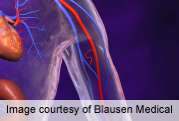INR variability predicts warfarin adverse effects

(HealthDay)—Unstable anticoagulation predicts warfarin adverse effects regardless of time in therapeutic range, according to a study published online Sept. 2 in Circulation: Cardiovascular Quality and Outcomes.
Zayd Razouki, M.D., from the Bedford VA Medical Center in Massachusetts, and colleagues calculated time in therapeutic range (TTR) and log-transformed international normalized ratio (INR) variability for 40,404 patients (≥65 years) anticoagulated for atrial fibrillation with warfarin and seen within the Veterans Health Administration. TTR was categorized as (high, >70 percent; moderate, 50 percent to 70 percent; and low, <50 percent), while log INR variability was categorized as stable and unstable. The reference groups had good control (high TTR and stable anticoagulation).
The researchers found that higher log INR variability (unstable control) predicted ischemic stroke (hazard ratio [HR], 1.45) and major bleeding (HR, 1.57) independently, regardless of TTR levels. At moderate TTR levels, high log INR variability predicted a significantly higher risk for ischemic stroke and major bleeding compared with low log INR variability (HR, 1.27 and 1.29). At high TTR levels the association was even stronger (HR, 1.55 and 1.56). The association did not hold at low TTR levels.
"Knowledge about anticoagulation stability further stratifies the risk for adverse events at given levels of TTR," the authors write.
More information:
Abstract
Full Text (subscription or payment may be required)
Copyright © 2014 HealthDay. All rights reserved.
















